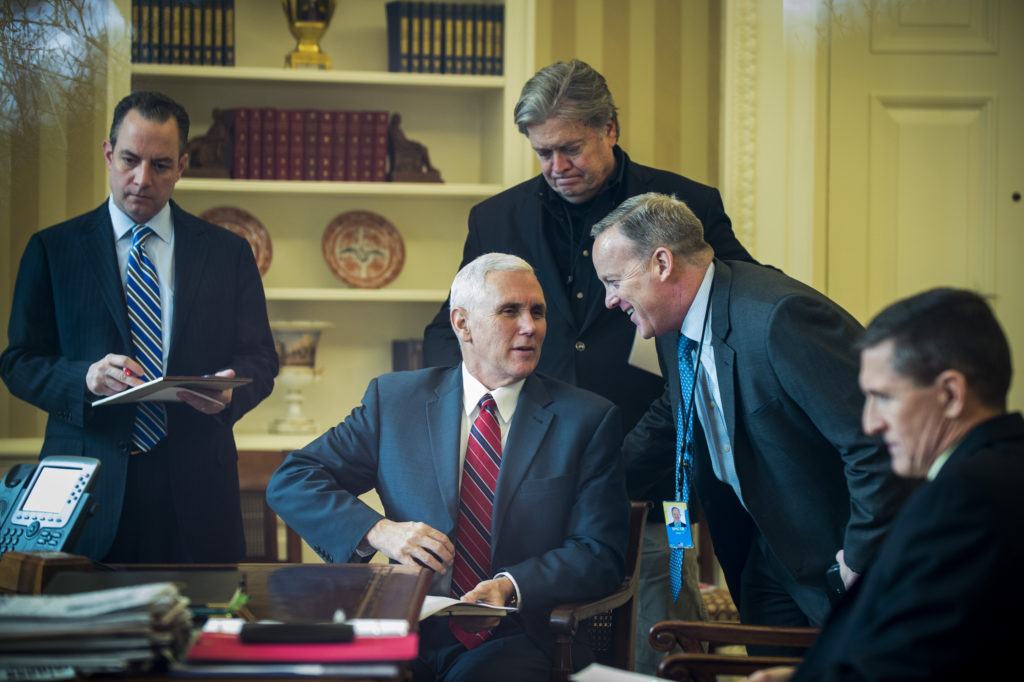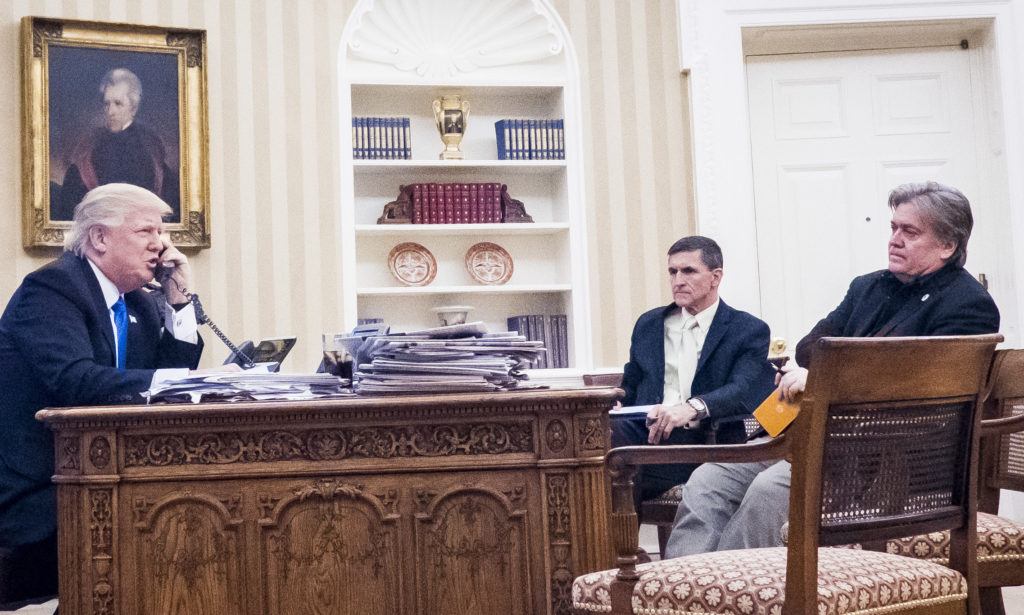Photo by Olivier Douliery/Abaca (via PA Images)
Henry Olsen, editor of UnHerd’s “flyover country” theme, spent an hour with Steve Bannon in the White House last week – partly to talk about his new book on Ronald Reagan. Henry argues that Bannon’s understanding that middle America wants government help is still being rejected by Washington Republicans. The man who helped to rescue Donald Trump’s faltering campaign last year – but now returning to the Brietbart news network – might become one of this administration’s strongest critics if the ‘Grand Old Party’ (again) becomes a creature of Wall Street and other business interests.
Steve Bannon, the controversial former White House strategist, is gone, but not forgotten. At least he shouldn’t be forgotten, not least of which by a Republican Party still struggling to figure out how to proceed in the wake of Donald Trump’s surprise victory. Bannon has many faults, but his vision for a flyover-country–friendly GOP was spot on.
Bannon saw early on what few other Americans did: that millions of Americans without a college degree were bearing the brunt of the country’s sweeping economic and cultural changes. Their jobs were disappearing or paying less; their values were under constant assault or ridicule from educated Americans right and left; their children were fighting America’s wars and policing America’s streets, with the former seemingly never ending and the latter increasingly caught up in the nation’s racial controversies. Many of these people were habitual Democrats but they were ready to abandon a party they felt no longer cared about people like them – but only for a Republican Party they thought did.
On free trade, controlling immigration, opposing overseas wars, Bannon was not a typical Washington Republican
Bannon, who grew up in a Democrat family himself, saw what long-time Republicans would not: these people would never support a party that they thought cared more about money than people. So Bannon – as both editor of the website Breitbart and as chair of the Trump campaign – emphasised issues and causes that weren’t typically Republican, issues that appeared to place people ahead of profits. Attacking free trade was one, crusading against illegal immigration was another.
The result was Trump’s unexpected victory fueled by record high support for a Republican nominee among white voters without a college degree. Trump won these voters by a whopping 37 points, 66-29 according to the exit poll. Moreover, he won subsegments of these voters that almost never vote for Republicans. Many of America’s non-college whites are evangelical Christians, and they regularly vote Republican because of their social conservatism. Non-evangelical Christian, non-college whites have always been leery of a business-friendly GOP, but they flocked to Trump precisely because he wasn’t cut from the same cloth. These voters fueled his narrow victories in Michigan, Pennsylvania, and Wisconsin that gave him the White House under America’s unique Electoral College system.
One would think this would have opened Republican eyes. You would be wrong.
Bannon helped Trump win by motivating a different voting coalition – unfortunately the Republican leadership hasn’t noticed
Despite the fact that large numbers of these new Republicans get their health insurance through Obamacare, the GOP’s Congressional leadership tried to shepherd through bills to repeal and replace Obamacare that emphasised cutting taxes and spending over providing affordable health insurance for the working class. There is seemingly no appetite to deal either with the negative effect global trade has had on millions of Americans or with the illegal immigration that continues to tax American communities. They are preparing to introduce a tax reform plan that gives almost no relief to working class voters but slashes taxes for corporations and the rich. Republicans are acting like the classic post-Napoleonic Bourbons, forgetting nothing and remembering nothing.
Bannon was often wrong. He was peculiarly blind to the effect failure to vociferously condemn white nationalism would have on his putative political coalition. Denouncing neo-Nazis is about the easiest way to score political points there is: failing to do that is like Cristiano Ronaldo missing a sitter in front of goal. Those on the right who, with Bannon, point out the extreme left’s own proclivities to provocation and violence, should recall Jesus’ admonition to remove the beam from your own eye before you criticise the mote in your neighbour’s. No centre-right coalition anywhere in the world can be constructed without clearly rejecting the neo-fascist elements that still lurk in nationalist swamps.
Nor was Bannon correct in his sweeping rejection of America’s traditional global alliances. He is right that many Americans are tired of foreign wars that seem endless, but Americans still support an active global military presence even as they disagree on the extent to which such presence should extend. This is particularly true with military commitments to fight Islamic terrorism, as is the case in Afghanistan. Combatting Islamic terror is the single issue that unites populist blue-collar voters with traditional Republicans, and polls usually show support for overseas involvement rises when a foreign threat materialises.

The voters Trump brought to the Republicans don’t want libertarianism – they want help
Bannon’s errors, however, should not obscure his major insight, that blue-collar voters beset by economic and cultural change want active, not passive, government. Around the world, these voters want governments that understand and care about their views and problems. They do not want to be treated like collateral damage in the pursuit of a global society. They are not the serfs of urban elites, and they do not want to be led irretrievably down the road to serfdom.
Donald Trump, whether by instinct or reflection, understood this. His brusque manner, as well as his indulgence of the basest and coarsest instincts in American politics, alienated millions. But for his blue-collar fans, he is the only leader who really cares about people like them.
Bannon had one other insight center-right leaders around the world should take to heart. He once said that the populist movement wasn’t going away, the only question was whether it would join with the left or the right. That seems to be the case in virtually every country in the world: the only alternative is the formation of a new, centrist, left-right alliance of the well-to-do like Emmanuel Macron’s Republique En Marche. For a host of reasons, that will not happen in the United States any time soon.
Republicans sit on a knife’s edge. Stray but a little from the populist-conservative alliance and the American Left will have a chance to shape American politics for years to come. To avoid Senator Elizabeth Warren becoming the next president, Republicans need to listen to Steve Bannon.








Join the discussion
Join like minded readers that support our journalism by becoming a paid subscriber
To join the discussion in the comments, become a paid subscriber.
Join like minded readers that support our journalism, read unlimited articles and enjoy other subscriber-only benefits.
Subscribe